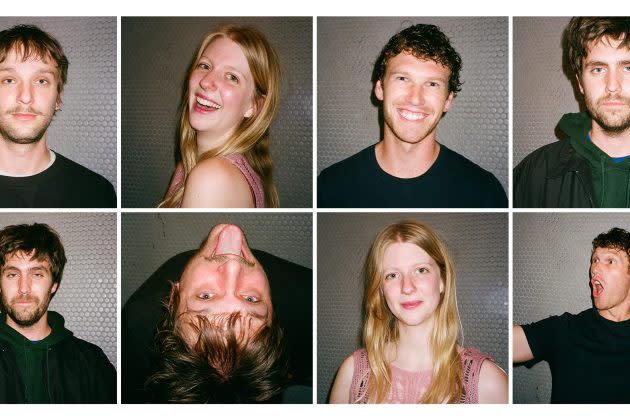Slow Pulp Went to a Cabin in Wisconsin and Came Out With One of 2023’s Best Rock Records

When it came time to write Slow Pulp’s sophomore album, in early 2021, Emily Massey decided to isolate herself in a cabin up in northern Wisconsin.
“The first day, I full-body cried for hours,” the singer tells Variety. “I realized when I got there that I’d never been that alone. It was winter, so I couldn’t go anywhere outside the house. I felt trapped.”
Disconnected from the world during the throes of the pandemic, Massey spent her days writing songs on the guitar and recording demos on her laptop. The cabin had no internet connection, but it did have an old CD collection left behind by the owners. That’s where Massey discovered Lucinda Williams’ “Essence.”
“It just felt like an album that I needed to hear at the time,” she says of the 2001 effort, Williams’ follow-up to her critically revered, Grammy-winning “Car Wheels on a Gravel Road.” And, as if via osmosis, Williams’ acoustic sparsity, country twang and slide guitar seeped into Slow Pulp, a band typically characterized by loud, distorted electric guitars and bedroom pop aesthetics. As she became more enamored with Americana music, Massey laid the foundation of “Yard,” which the indie rock quartet released on Sept. 29.
“I was able to be so emotionally vulnerable as myself, I didn’t feel like I had to be anything for anybody else,” Massey says of writing the album. “I allowed myself to just make things that were really bad, and move on from it. I didn’t have this inner critic that I normally have.”
That’s partly because “Yard” inverted Slow Pulp’s usual songwriting process. Whereas most of the tracks on the band’s debut album “Moveys,” and its preceding EPs, started with fleshed out instrumentals complete with riffs and other melodic elements, “Yard” grew outward from small ideas.
“Before, I found it really hard to write a melody and lyrics because it didn’t feel like there was enough space for me to exist in there,” Massey says. “On this record, we were really intentional about starting everything from a sparse space.”
In early November, far from the Wisconsin wilderness, Massey sits backstage at Le Poisson Rouge, a (literally) underground venue nestled in the heart of Manhattan’s Greenwich Village. Her bandmates, bassist Alex Leeds, drummer Teddy Mathews and guitarist-producer Henry Stoehr, laugh loudly in the green room just two hours before the band takes the stage for the second of three consecutive sold-out shows in New York City. The night prior, Massey commanded a crowded Bowery Ballroom and drew impassioned yelps during a three-song encore and (not one, but two!) harmonica solos. That must feel good. “It doesn’t feel bad,” she laughs. “We’re very humbled by the whole thing.”
Slow Pulp released their first project in 2015, but the band’s origins date more than a decade before that, when Stoehr and Mathews met at age 5 in a McDonald’s ball pit in Madison, Wis. The two became childhood friends, and at age 10 met Leeds while taking music lessons. The boys formed a band and, many years later, met Massey through the music scene attached to the University of Wisconsin-Madison.
“The three of them had a band already and asked me to join as a rhythm guitar player and backing vocalist, which is kind of funny because” — Massey tosses her hair and laughs sarcastically — “I took over!”
After Slow Pulp’s self-released 2017 EP was discovered by a popular indie music YouTuber, the band cultivated a big enough audience to play shows outside of Madison. In 2018, the group moved to Chicago, cutting their teeth in the city’s 100-cap clubs. In the heat of the pandemic, Slow Pulp released the debut album “Moveys” to critical acclaim, and signed to ANTI- for their 2023 follow-up, “Yard.”
On its stunning title track, Massey’s usually obscured vocals are laid bare as she laments a childhood home gone up for sale and apologizes to her younger sister for being absent.
“She had to get dragged along to all of my ballet recitals and concerts, and I never went to one of her sports games, ever,” Massey says. “I think she holds some very fair resentment for that.” (“Missed the volleyball game,” the singer sighs in the first verse. “I’m a bitch.”)
It’s Slow Pulp’s starkest and most direct song yet — and Massey’s personal favorite on the new record.
“I played it for my family and we all just sat around and cried,” she remembers. “And I don’t have any other songs where it feels that emotionally intense. It’s still hard to play live, I get choked up.”
That night, Massey held her heart while singing the song’s central admission (“I’m sorry I wasn’t there enough / It’s on me”), and her eyes glimmered as she stretched her arms wide during the outro. She broke into a smile as the audience’s rapturous applause washed over her.
Best of Variety
Sign up for Variety’s Newsletter. For the latest news, follow us on Facebook, Twitter, and Instagram.
